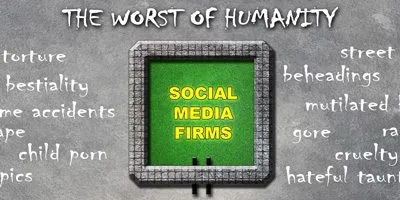Social Media Dangers We Don’t See But Foretell Its Future
Posted on27 Feb 2017
Tagssecurity, control, illusion, internet, negative, New York Times, social media, CBS News, Time Magazine, Wired Magazine, YouTube, PTSD, censorship
Comments0
People talk of trolls, fake news and acerbic comments on social media. The presidential election brought these even more to the fore.... Read More
Rise of Self-Censorship
Posted on04 Sep 2014
Tagsproblem solving, disagreeable, muscles, CBS News, homophily, peer-to-peer marketing, people's differences, New York Times, negative, minds, innovation, emotions, creativity, conflict
Comments8
Life requires effort. Just as it’s easy to be inactive and not eat right, it’s easy to associate with people who are... Read More
Secret to Creativity (Pt 2): Innovative Process and Taco Bell
A venture firm presented their search process. It began with examining about a 1,000 companies. Of those, they analyzed business plans from... Read More
Protection from Unwanted Unconscious Influences
Posted on03 Apr 2014
Tagsanchoring, control, decisions, free will, Influence, negative, price, sales, smells, subconscious, Twitter, inflammatory rhetoric
Comments0
Finola Howard (@FinolaHoward), a marketing professional, found my post, “Information You Know Is Wrong Still Influences You,” interesting but wanted to know,... Read More
How Psychopaths Become CEO’s (Pt 4) – Preferred Cultures
Posted on22 Aug 2013
Tagsauthority, competitive, conflict, organizational culture, dissent, diversity, education, emotional intelligence, Harvard Business Review, incentives, negative, process, psychopaths, relationships, rules, self-interest, Psychopath in Workplace Series, bottom-line focus, ends justifies means
Comments0
Previously, the situations and trends psychopaths prefer. Now, we will discuss the cultures as summarized in the introductory post of this mini-series:... Read More
Emotions vs Intuition (Pt 2): Operational Difference
Emotions drive our energies in a particular direction. Intuition interprets that direction similar to the way thinking interprets facts. Unlike emotions, intuition... Read More
Business Examples of Patience’s Merits (Pt 2): Ethical Behavior
Posted on18 Oct 2012
Tagscognition, University of San Diego, The Economist, rationale, patience, negative, lying, John Hopkins University, honesty, Frank Partnoy, ethics, Brian Gunia, aesthetics, Adrian Wooldridge
Comments0
When I first wrote about patience, a commenter asked for examples of its merits. So, when I ran across the article “No... Read More
Relationship Building Technique #3: Pause
Posted on13 Feb 2012
Tagsconflict management, conversation techniques, emotions, feelings, gestures, listen, negative, pause, perspective, quiet, Relationship Building Techniques Series, relationships, Techniques, Thoughts
Comments3
We often don’t learn the value of listening techniques in building relationships. Consequently, people might not realize we are listening; this needs... Read More
Positive-Negative Reinforcements: Pluses and Minuses
It’s generally easier to understand what positive and negative reinforcements are than it is to understand their advantages and disadvantages. Trade offs... Read More
Cooperation vs. Self-interest (Pt 6): Incentives & Rats
Posted on26 Dec 2011
Tagscooperation, Cooperation vs Self-interest Series, dog-eat-dog world, extrinsic, Harvard Business Review, health, intrinsic, Lily Tomlin, money, negative, positive, rat race, rats, rewards, self-interest, subconscious, The Unselfish Gene, understanding, Yochai Benkler
Comments0
In Part 4 of this series, I discussed the positivity of intrinsic rewards in the workplace. Let’s now address the negative impact... Read More




